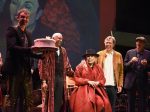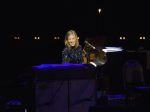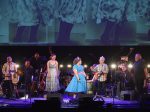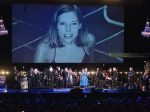Joni Mitchell celebrated in song, sing-alongs — and a birthday cake for the honoree herself
Steve Hochman on
0

The first song of the Joni Mitchell tribute concert Wednesday at the Dorothy Chandler Pavilion was also the first song on a tribute (and collaboration) Mitchell herself did, 1979’s album “Mingus,” for and with jazz composer Charles Mingus. The performance of it this night was not by any of the all-star artists that would be on stage, but rather by the audience, sung to Mitchell. It was, of course, “Happy Birthday,” as she turned 75 this day, and it was sung as she slowly made her way to her seat, steady but slowed by the effects of a brain aneurysm more than three years ago.
It was a perfect way to kick off the parade of performers taking the daunting task of tackling selections from Mitchell’s catalog. It’s not just that many of the songs are difficult to sing, filled with Mitchell’s idiosyncratic melodies and modalities. It’s that the very composition and construction of the songs, as we know them, are so indelibly tied to the presence of Mitchell herself in them. But everyone on the bill was game, and many of them transcended mere tribute and brought their own artistry to the chosen songs, a tricky thing. (The same set was done Tuesday, but without Mitchell there. Wednesday’s show was followed by a gala soiree to give her the Music Center’s Excellence in the Performing Arts Award.)
Norah Jones and Glen Hansard started it off fine with “Court and Spark” and “Coyote,” respectively, adding touches of country twang and Irish exuberance, also respectively — Hansard interestingly not changing the gender of his number, written about Sam Shepard.
These also served to showcase the ace talents of the house band, co-led and co-arranged by pianist Jon Cowherd and drummer Brian Blade (the latter a former Mitchell musical cohort), which through the show got the full sense of nuance and depth in the music, effectively traversing that tightrope between Mitchell-worthy creation and devoted re-creation. Greg Leisz’s pedal steel and guitar and Ambrose Akinmusire’s trumpet (a ghostly romantic Chet Baker/Miles Davis tone) and Bob Sheppard’s sax and woodwinds (soprano sax evoking Mitchell veterans Tom Scott and Wayne Shorter, in particular) were key to the sound throughout, abetted by some guest work from violinist Scarlet Rivera.
That high wire was also walked by the best of the tributers, some choosing to rework the material in their own manner, others sticking more to the Mitchell blueprint. Neither is an easy route.
On one side, Diana Krall, Seal and a teaming of members of Los Lobos and La Santa Cecilia — two generations of L.A.’s Mexican-rooted musical community’s finest — maximized the combination of the performers’ talents and visions with the incomparable artistry of Mitchell.
Krall, following Jones and Hansard, turned “For the Roses” into an invocation, dancing confidently through her classical-jazz piano interpolations and singing with an intense focus somehow at once fully immediate and hauntingly distant, bringing us to hushed reverence during the song and having stolen our breath by its end. She repeated that magic with “Amelia” in the second half, paired just with the low atmospherics of bassist Christopher Thomas, her two performances sanctifying the evening.
Seal gripped the crowd on “Both Sides Now,” making one think of how a Nat King Cole or Johnny Mathis might have handled the song, and with “A Strange Boy” went full into a distinctive soul-jazz-art song approach.
With “Dreamland,” the Lobos/Cecilia meld took the Afro-Latin percussion that powers Mitchell’s dazzling 1976 version as a starting point, transforming it into a Mexican folk song, seamlessly splicing “La Bamba” into the middle. The irrepressible Cecilia singer La Marisoul, playfully and pointedly, even sang the first line “It’s a long, long way from East L.A.” rather than “Canada” — never mind that the next line is about snow chains. A big bonus: Chaka Khan, who is on the original, joined in here, too, she and La Marisoul having a blast with their vocal parries.
Khan, too, was terrific with her versions of “Help Me” — a bit funkier than Mitchell’s, moving from quiet storm to full-force gale — and the haunting, lesser-known 1982 song “Two Grey Rooms.”
On the other side was Brandi Carlile. After a charmingly ragged second-half duet with a well-worn Kris Kristofferson on “A Case of You” (“I could drink a case of you, and still be on my feet… darlin’!”), she hewed as close to the original as possible on “Down to You,” and beautifully so, not just hitting Mitchell’s notes (including the high ones), but evoking her spirit. The band also shined brightly on the latter with the sparkling chamber-orchestra instrumental passage.
Somewhere in the middle came Emmylou Harris, Rufus Wainwright and James Taylor, finding their own balance on that tightrope. Harris brought her signature interpretive sensibilities to “Cold Blue Steel and Sweet Fire.” Then, after first noting that Mitchell inspired every girl who wanted to pick up a guitar (“but that song has too many chords for me”), she cited Mitchell’s bold dives into darkness, “Cold Blue Steel” being about heroin addiction) and slyly said she would “lighten things up” with “The Magdalene Laundries,” a song “about women enslaved in Irish convents.”
Wainwright winningly added his mannered drama to “Blue” in the first half, and some almost ’60s Broadway flair to “All I Want” in the second, the band’s arrangement spiked with some dissonant horn work. And Taylor, his low-key rustic elegance as shining as ever, took a stool for the wintry “River” in the first part and summery “Woodstock” in the second, each somehow fully his and fully Joni’s.
The only song of the night not written by Mitchell (other than “Happy Birthday”) was one written for her: Graham Nash starting the second half of the show with “Our House,” his portrait of the Laurel Canyon domesticity he and Mitchell shared some 46 years ago, leading the audience in a spirited sing-along as on the screen behind the stage a photo he took of her in a windowsill dissolved into a painting she made from that same picture.
Mitchell’s paintings and some photos of her were projected all night, and some audio clips (and one film bit) of her served as punctuation for and introduction to some songs. The set was festooned with Canadian comforts — a canoe suspended over stage left, skis leaning at the back of stage right, barrels on either side of the front as well as sofas set at the edges, the one on stage left hosting Wainwright (whose husband, Jörn Weisbrodt, Music Center artistic producer, co-produced this show) for most of the evening when he wasn’t performing, often with Harris at his side, both of them delightfully entranced and engaged by whoever was singing at the time. A few times, Wainwright and/or Seal stood to the side with a mic and sung backup, a collegial touch that perhaps could have been employed more as a thread of community through the show.
On that note, the show concluded with a fun, ramshackle all-hands version of “Big Yellow Taxi,” the curtain coming down quickly as it ended. But no one left, anticipating what was to come. After five minutes or so, the curtain rose again, Mitchell at center stage, supported on either side by two men, then taking a seat as the cast and crew gathered around, Weisbrodt bringing out a cake, Mitchell blowing out her candles with a big grin as everyone again sang the birthday song to her. Then as the cast reprised “Big Yellow Taxi,” Mitchell not just stood, but danced a little, mouthing the words and beaming to the boisterous applause from her fans.
Photos by Vivien Killilea/Getty Images for The Music Center












Leave a Reply